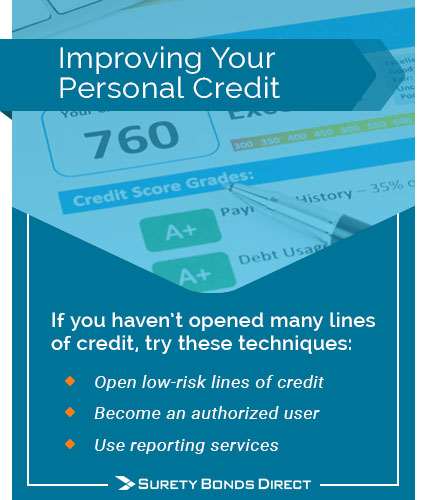8 Ways to Lower Your Surety Bond Cost
Tips from the experts at Surety Bonds Direct can help you lower the cost of your bond and build a stronger business.

Obtaining a surety bond is an essential step for many different types of businesses. Surety bonds for automobile dealers, construction and maintenance contractors, mortgage brokers and many other types of businesses are legally required as part of the licensing process. Even for businesses that aren't required to get bonded, a surety bond is a great way to protect your customers and your reputation.
However, the cost of getting a surety bond can be a significant obstacle for many people. A customer with good credit and liquid assets will usually pay one to three percent of the bond amount as a premium, depending on the bond type—but for the 68 million Americans with subprime credit scores, those premiums can be considerably higher. And even if you have a higher credit score, some larger bonds require significant up-front collateral that can be tough to come up with all at once.
Surety Bonds Direct specializes in helping our customers find a great price on the bonds they need. You shouldn't let the cost of getting a surety bond stand in the way of your dream of owning a business. We're here to advise you on how you can get a bond at a price you can afford, no matter what your credit score is.
What kinds of steps can you take to lower your rates to an affordable level? Our surety bond experts know the ins and outs of improving your credit score, boosting your liquid asset levels and more. These eight key tips will help you present your best financial face to surety underwriters and find the most affordable rate on the bond your business needs.
1. Make sure that your credit score is accurate.
One thing that many people don't know about improving their credit is that credit rating agencies sometimes use old and inaccurate information to assign their scores. In fact, a Federal Trade Commission study found that 26 percent of participants had at least one error on their credit reports. Thus, it's important to take a look at your reports and make sure that simple clerical errors aren't hurting your credit.

Using one of the many free credit reporting tools available online, examine your credit reports for common errors, such as:
- Debts you've paid off that have been reported to one credit agency but are still on your credit report with another.
- Accounts belonging to people with similar names that have been mistakenly added to your report.
- Fraudulent accounts opened by identity thieves using your personal information. (Irregularities in your personal information can be a warning sign of this.)
- Outdated information on your credit card balances and limits.
- One account listed multiple times on the same report.
- Incorrect payment dates or accounts reported as delinquent.
If you find errors on your credit reports, you'll need to file disputes with the credit reporting bureaus. Unfortunately, you'll usually have to do this with each credit bureau separately, but it's worth the time and effort to ensure that your credit isn't being damaged by someone else's mistakes.
2. Take steps to improve your personal credit.
If a credit agency isn't able to correct your credit records, there are still plenty of steps you can take to repair your credit. It won't be an instant improvement, and it can require some sacrifices and financial discipline, but it's definitely possible to improve your credit more quickly than you might think.

Repairing your credit involves responsibly managing and paying off your debts to show that you're in control of your financial situation. Here are some of the most effective ways to improve your credit score:
- Make a detailed and accurate budget, including funds allocated to pay down debts and pad your savings, and stick to it carefully.
- Set up automatic payments and reminders to ensure that your credit card and loan payments are always made on time. Just a few late payments can significantly downgrade your score.
- If you've only been making minimum payments on your debts, make it a priority to pay them down more quickly. This is especially important for debts with high interest rates or ones that have gone unpaid for some time. The faster your debts get paid off, the more quickly your credit score will recover.
- Look into your options for negotiating settlements with debt collectors, as you may be able to settle for less than the amount you owe.
- If you can help it, don't apply for new credit cards or loans. These trigger "hard inquiries" into your credit record that can damage your score if you have too many in a short period of time.
- If you have to make new purchases on credit, make them on cards with higher limits to reduce your utilization rates.
It can also be helpful to talk to credit repair or debt settlement organizations, who can show you effective strategies tailored to your needs. However, many shady companies also masquerade as legitimate credit repair and debt settlement businesses, so make sure you've done due diligence to ensure they're above board.

If you haven't opened many lines of credit (such as loans or credit cards), you might be dealing with a lack of credit rather than bad credit. Here, you've got the advantage of starting from scratch, so try these techniques:
- Open low-risk lines of credit through secured credit cards, credit-builder loans or secured loans.
- Become an authorized user on someone else's credit card who has a good credit score and use it responsibly.
- Use reporting services like RentTrack and Experian Boost to get credit for paying your rent, utilities and phone bill on time. (These won't always work for every credit service, but they will improve some.)
3. Become a U.S. citizen.
Unfortunately, many sureties in the U.S. assign a higher risk category to principals who don't have U.S. citizenship. If you are not currently a U.S. citizen, getting your citizenship can help you get a lower rate on your surety bond in addition to its many other benefits.
The process to become a U.S. citizen is long and somewhat complex, and you'll have to go through a number of steps, including:
- Completing application form N-400.
- Passing a test in English proficiency and U.S. civics.
- Providing the U.S. government with essential documents, including copies of your green card, photographs of yourself and fingerprints.
- Completing an interview with U.S. Customs and Immigration.
Despite the relative complexity of the process, the benefits can be fairly immediate. Many sureties will offer a lower rate once you can prove that you've obtained your citizenship.
4. Provide strong financial statements with good liquidity and working capital.

For many smaller surety bonds, underwriters will only examine your personal credit. However, for some larger surety bonds, the underwriters will go beyond your credit score and take a deeper look into your business's financial history and current assets. Sureties will be more confident that you'll honor your indemnity obligations if you have ample access to working capital and have shown responsibility in managing your debts. Thus, if you have to provide financial statements, it's important that they demonstrate a solid track record and day-to-day financial stability.
A financial statement for a surety bond application will usually include the following elements:
- Balance Sheet: A picture of your business's current financials, including assets, liabilities and ownership equity. Typically provides the most detailed summary.
- Income and Expense Statement: The long-term counterpart to a balance sheet, showing assets and expenditures over a period of time (usually one year).
- Cash Flow Statement: A streamlined cousin of the income statement that focuses on a business's short-term quarterly income.
You'll usually want to enlist a CPA's help in preparing these statements to ensure that they present a strong and accurate picture of your financials. If your liquidity ratios are less than ideal, consider improving them using common techniques such as selling off unnecessary assets and refinancing short-term debt with long-term debt. Showing greater liquidity will often increase an underwriter's confidence in your business's stability and help you get a more favorable rate.
5. Purchase a longer-term bond for a discount.
Surety bonds are typically purchased in terms of one year. However, some surety bonds companies offer a discount for principals who are willing to purchase a bond for two or more years rather than one, and the savings can be substantial. If you're interested in getting a multi-year rate on your surety bond, contact our surety bond experts to find out if one is available for the bond you're interested in.

6. Add a cosigner to your bond.
Using a cosigner isn't just a way to increase your approval odds for a loan. It can also be a great option for lowering your surety bond rate. If you have a subprime credit score, you can sometimes ask a surety to add a cosigner to your bond. The rate for a cosigned bond will then be based on you and your cosigner's combined credit score. The surety will add your scores together and then divide in half to get the new score used to calculate your bond rate.
Asking for a cosigner doesn't guarantee that you'll be approved for a lower rate, but it can be helpful. Since your cosigner's credit will be a key factor, you'll want to find a cosigner with the best credit possible—spouses, friends, family and business partners are all common cosigners. Finally, make sure that your cosigner understands that, unlike with other types of insurance, they are assuming the indemnity associated with your surety bond.

7. Use a financing plan.
Even for principals with good credit, the up-front cost of a surety bond can sometimes be difficult to come up with. That's why Surety Bonds Direct offers premium financing plans for many of our bonds. These plans can help you get your business set up more quickly, as you can receive your bond right away, but spread the premium payments out over a period of months.
Requesting a premium financing plan from Surety Bonds Direct is easy. Just use our free quote tool and then check to see if your bond is eligible for a premium financing offer. By using a premium financing plan that works for you, you can reduce the up-front cost of your premium and free up important funds to use elsewhere.
8. Find your bond through Surety Bonds Direct.
No matter what your credit score is, and no matter what type of surety bond you need, the best way to find the bond you need is through Surety Bonds Direct. Our approval rate is 99 percent, and our premiums are often considerably lower than other surety bond agencies.

Why are our surety bond rates so much more affordable than our competitors, and why are we able to offer them even to customers with imperfect credit? Our secret is in our name. We're called Surety Bonds Direct because we work directly with hundreds of reliable surety providers around the U.S., rather than involving other brokers who take their own cut and raise your rates. Unlike other agencies who may sell all kinds of insurance, we specialize exclusively in surety bonds, allowing us to focus on cultivating the best network that saves our customers the most money and time.
Many of the sureties we work with also specialize in helping customers with imperfect credit, as well as new businesses that may not have an extensive financial track record. All sureties we work with have an A.M. Best "A" rating, so you can rest easy knowing that they've been thoroughly vetted and will provide you with reliable coverage you can count on.
If you need a great rate on a surety bond, Surety Bonds Direct is here to make it easy for you. The first step is to use our quick and easy surety bond quote request form to get a quote on your bond in minutes. Many of our customers are surprised to learn that we offer numerous bonds with minimal paperwork, and that in some cases, they don't even need a credit check!
However, you've still got options if you need a lower cost than the one quoted. Give us a call at 1‐800‐608‐9950 or contact us online. Our experts have the insider knowledge to help you create a plan to lower your rate. We have an extensive network of surety partners, and we use it to do what we love: helping our customers overcome tough circumstances and fulfill their entrepreneurial dreams.
 Jason O'Leary
Jason O'Leary
updated: